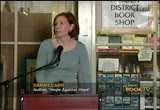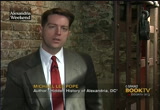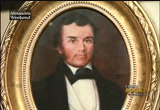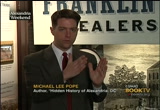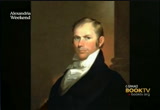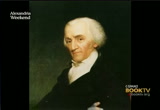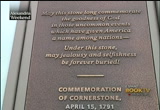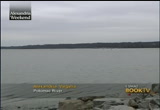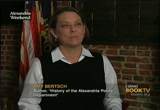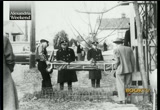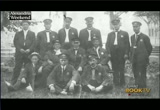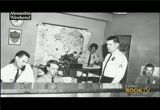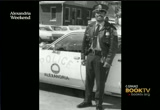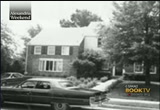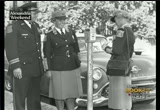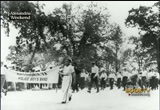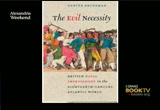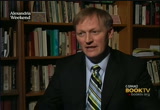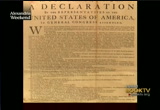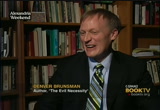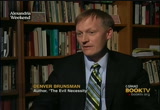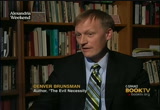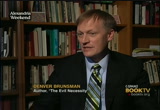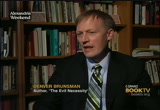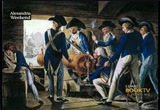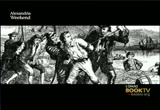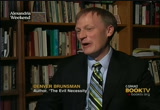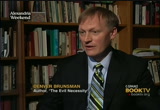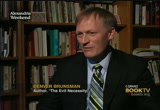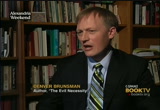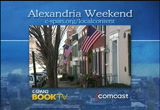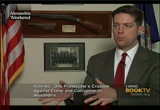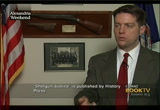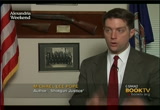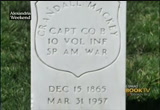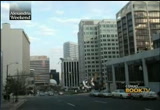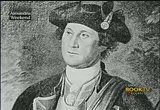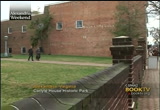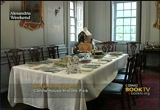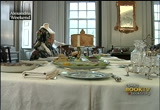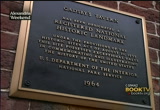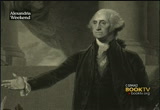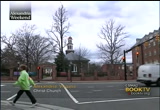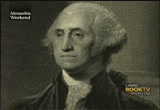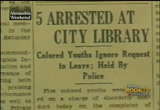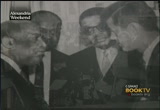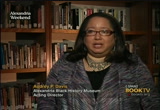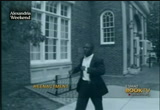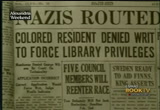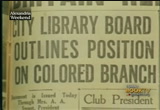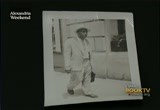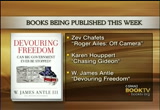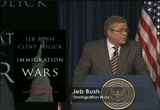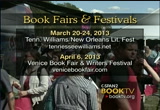tv Book TV CSPAN March 16, 2013 12:00pm-1:00pm EDT
12:00 pm
makes it very hard for schools to develop, vibrant arts programs and music programs to kind of have the educational offerings that reach an appeal to the diversity of kids who are out there. .. >> or tweet us at twitter.com/booktv. >> well, george washington enjoyed a long 50-year relationship with al sand
12:01 pm
alexandria. we like to say this is george washington's hometown. >> this gives our visitors a great picture of what the interior of a civil war fort would have leaked like. >> did you know alexandria was part of the original district of columbia? >> welcome to alexandria, virginia, on booktv. with the help of our cable partners, for the next hour we'll take you to this town on the potomac river just a couple of miles south of washington d.c. join us as we explore its rich and varied history through the works of local authors beginning with a look at some of the city's hidden stories from the past. >> book is "hidden history of al alexandria d.c.," and the last part of that title is very important because it's not about alexandria, virginia, or it's about a period in history when the district of columbia included parts of what's now virginia. what i wanted to do was look at this 50-year time period and get a sense of why al sabd drink ya became part of the district of
12:02 pm
columbia, what went wrong and why it left. one of the things i really wanted to do with the book is give people a sense of what life was like in this time period. fire fighting, for example, worked very differently in this time period. crime worked very differently, slavery played a crucial role in the business world of this time period. politics were very different. i've got, i did lots of research on the politics of this era. this was a whig town, and what was, essentially, a democratic city. so i thought that was kind of interesting because today in the modern world this is a democratic town in what's, essentially, a republican state. so from that sense there's sort of a through line that you can look back to this time period and see there was a political division then that still exists today. when i was doing the research for the book, i found three places that i would really like to take you to give you a sense of what it was like to live in alexandria d.c. one of them is jones point park. this is where you will find the original boundary marker for the
12:03 pm
southernmost tip of the district of columbia. the other is the dueling ground where a very famous duel took place between secretary of state henry clay and virginia senator john randolph. the other place i was really interested in taking you is the infamous slave pen at the franklin and armfield slave dealers which is where we're heading next. we're standing in one of the hidden gems of old town alexandria, this is the famous slave pen at the franklin and armfield slave dealers. we're located right now in the basement of the northern virginia urban league. this was, at one time, the most prosperous slave business in america. franklin and armfield would round up slaves from all points; virginia, maryland, um, even delaware. and they would bring them here, process them, and then they had camps. there was a men's camp on one side of the campus and a women's camp on the other side of the campus. they weren't allowed to comingle
12:04 pm
with each other, and they were kept here until they could be sold in large quantities down south. and so then they would be transported either via ship or sometimes marched on foot down through mississippi and louisiana. when the union army invaded alexandria, one of the first places they came was here to this slave pen because it was an infamous spot in slavery. it had been featured in all of the abolitionist newspapers of the time period, so when the union soldiers came here, they came down here to the basement where we're now standing and found slaves actually shackled to the wall. slavery played a very important role in the history of the district, the early history of the district of columbia. it also played a very important role in why alexandria wanted to leave the district of columbia. if you were to take a look at this 50-year time period that alexandria was part of the district of columbia, you would see that the business of slavery was the predominant business in alexandria. it was where all the money was at. and so this slave-trading operation that we're standing in
12:05 pm
right now was the most, one of the most successful businesses in alexandria. and it was so successful, as a matter of fact, that the threat posed by the potential outlawing of slavery in the district of columbia was enough to push this movement forward for what they called retrosession which was alexandria leafing the district of -- leaving the district of columbia. so slavery played a very important role as the predominant business, it also played a key role in why alexandria wanted to leave the district of columbia. >> we're standing now at the dueling ground in north arlington. this is a famous spot because this is where the duel happened between secretary of state henry clay and virginia senator john randolph. this is a little-known duel. i've actually never heard of this duel until i started researching the history for the book. but these are two titans of american politics, the modern-day equivalent of this would be secretary of state john kerry versus virginia senator
12:06 pm
mark warner. so they arrived here on the day of the duel after randolph had given a speech on the senate floor calling clay a black leg which is, essentially, a corrupt gambler. clay did not like this. they arrived here on the morning of the duel, they were handed weapons, they shot at each other, both sides missed, they were handed new weapons, they shot at each other and missed again, and then so they came together and so randolph said to clay you owe me a new coat, mr. clay, because the bullet had pierced his coat. so clay said to randolph, well, i'm glad the debt is not greater. right now we are at jones point. we're standing on top of the southernmost tip of the district of columbia here. and this is the boundary marker that was laid in 1791 when the federal government was creating the district of columbia. when you look at a map of the district of columbia, it looks like a diamond shape. but if you look at a modern map of d.c., it looks like moths
12:07 pm
have eaten the southern half of it. that's because the virginia part of the original district was retroseated back to virginia. this point is very significant because it was the original boundary marker of -- there were a number of boundary markers that were laid all around this area to point out the diamond shape, the actual boundaries of the district. but this was the first, and it was also there was a lot of ceremony that was involved in the placement of this stone in 1791 is when it was of placed here. so the significance, actually, it's a long story that dates back to 1784, right at the end of the american revolution. the congress was debating how they should have a capital city and whether or not they should create a district. a guy by the name of el bridge gerry suggested that a district be created. he suggested two possibilities. one was trenton, new jersey, and
12:08 pm
the other was georgetown, maryland. and so the congress debated it and eventually chose trenton. and then they kind of backtracked a little bit and approved funding for georgetown and trenton. the idea was that they would actually move in different parts of the year. they would be in trenton part of the year, then in georgeton another part of the year. virginians were willing to go to great length to make sure that the capitol was placed here on the to toe mack. and one of the peek that played a -- people that played a key role is a guy whose name has been lost to history, a man by the name of david stewart. he was actually related to washington, he was a business partner of washington. interestingly enough, david stewart actually laid the cornerstone here in that 1791 masonic ritual, the infamous compromise of 1790 is what finally sealed the deal. it had to do with the assumption of debt. after the revolutionary war, there was a whole lot of debt that had been taken on by the
12:09 pm
various states. and there was a, the politics of this is that the southern states had largely paid off their debts, but the northern states had not. so al sander hamilton wanted the federal government to assume these debts. james madison was against that, but madison and the virginians wanted the capitol on the potomac river. is so there was a famous dinner that was held at monticello, thomas jefferson's house, where thomas jefferson invited james madison and alexander hamilton, and over dinner at monticello they struck the compromise of 1790 which was that the federal government would assume the wartime debts from the revolutionary war in exchange for the capitol being placed right here on the potomac river. so the compromise of 1790 was actually the key deciding factor in creating the district of columbia. they came here to this spot we're standing on now and had a masonic ritual.
12:10 pm
this is the masons had their aprons and the trowels and corn oil, and they gave some speeches right here on this spot and did the ceremonial laying of the southernmost boundary marker which is what we're standing over now. and that was how the district was created. >> next on booktv, learn about the history of the alexandria police department. or author amy birch uses photos to tell the story of the department and the city of al sand alexandria. >> the name of the book is "the alexandria police association," published by arcadia which specializes in local history and photography books. at the time i was working at the alexandria police department and really found references to police cases, to the actions of police officers who'd been killed in the line of duty, just some very compelling history.
12:11 pm
and the more i learned about the police department's past and the more i learned about alexandria's past, the more i wanted to learn. the book starts in 1807 and really stops in 2006 right when we were getting ready to publish. fortunately, there was a great photo history to go with it. the police department, the police association, the local library had a lot of very good photo collections. it touches on the very early days of policing in alexandria which really dates to the late 18th century. but the alexandria police department itself was established in 1870, and that's really where the book starts. there were photographs taken of crash scenes, of crime scenes but also of members of the police department simply doing their jobs in contact with the citizens and then some off-duty work as well. really powerful photos were taken at murder scenes, and they weren't any extraordinary cases, they weren't high-profile cases,
12:12 pm
but it gives you a glimpse into what life was like at that moment that tragedy occur curred. and because it's crime scene photography, participants don't have a chance to clean up or put things away, and so you really see how people were living at the time that tragedy occurred. and so these photographs are black and white photos from the 1940s and '50s and were just very powerful images to be able to look and see what was going on in somebody's home or barber shop or a restaurant. things like prohibition and traffic enforcement that when the police had to start enforcing prohibition and they had to start enforcing traffic laws, there was resistance from citizens. and to see how, what was once a cooperative relationship between citizens and police really changed once police had to start ticketing people for driving or making arrests for people who
12:13 pm
were drinking liquor. alcohol was banned in virginia a few years before national legislation was passed. there were people who believed that if they could just go out onto a poet in the potomac and consume liquor, then that was not illegal because they weren't technically in virginia. earlier the alexandria police department didn't need a lot of vehicles. they didn't need a lot of motorcycles. it was a pretty small area they were responsible for patrolling, and so to see the size of alexandria double and then double again in a matter of pretty much 20 years really changed the department, increased staffing, more vehicles and then, ultimately, they had to move to a new police station pause they just couldn't fit in their original station house. one of the stories that i found really interesting is how officers began enforcing speed limits because, like, for the first 40 some years of the police force they didn't have cars. they had foot or emergency situation they had horses. there were not motorizedded vehicles. so once cars started coming
12:14 pm
through alexandria, speed limits had to be put in place. but the question was, well, how do you stop somebody for speeding? today we have radar, we have so many techniques, but 1910, 1911 there was no way to do that. they were pretty resourceful. they had two officers standing at one corner of one block and two blocks up an officer on another officer. they had somebody they know drive the speed limit between those two points so they knew what the maximum speed was and the distance that could be covered in a certain number of seconds. being able to approach the car and get it to stop is a whole other matter, but at least they had a way to enforce speed limits. in 1965 alexandria finally hired its first police officer of color, and his name was albert beverly, and he was from st. george county. and there had been pressure on the police department for a number of years to hire a black police officer, and there was pressure from the mayor,
12:15 pm
pressure from the community. and the police chief at the time said he wanted to do it, he repeatedly said i just have to find the right person. he wanted to find somebody who would be successful, his own jackie robinson, and that was al beverly. he did enjoy a 20-year career with the agency. one thing that's kind of interesting to alexandria's history is that in 1974 the president of the united states lived here for a week and a half, and what happened at that time was gerald ford, who had served as vice president, became president when nixon resigned. it all happened very quickly. at the time the ford family was living in many alexandria, and they'd been living there for 20 years. it was going to take a while for them to be able to move into the white house. so for a week and a half in august 1974, the president of the united states would wake up in his home on crown view drive in alexandria, and he would go out and get the paper, greet his neighbors and the media that had gathered, and then he would be
12:16 pm
escorted to d.c. so he could go to work at the white house. and alexandria police officers were detailed to provide security near his home, on the street and also assist in traffic escorts while that was going on. when world war ii hit, a lot of men had to go serve in the war, and some officers went and served in the war, so pretty soon there was a need for women to start working in the department. and that's really when they hired their first secretary, the first women were civilians who were ip doors. -- indoors. in the early 1950s, they wanted to free up police officers for more important things than school crossings, and so the department hired women to serve as crossing guards. with this group of women, there were three who were african-american, and it -- so not only was it the first time women were in uniform representing the agency, it was the first time people of color were in uniform representing the alexandria police department. and the alexandria police
12:17 pm
department was one of the earliest agencies to use k-9s in police work. they deployed the first k-9 unit in 1959, and within a couple years there was actually a police officer who had trained his dog to respond to radio commands. and the k-9 corps which eventually involved into the -- evolved into the unit, or very popular at the time unless you were a bad guy, and officer owe couple, the guy who trained his dog with the radio commands, unfortunately, he was killed in the line of duty. mucho was able to live with the family following his death. the alexandria police association today is much like it was in 1930. it's a benevolent organization. they work to support the interests of their members who are largely police officers. they will support if an officer has a family situation, a personal crisis, you know,
12:18 pm
they'll reach out and offer support to the family. they also provide scholarships to students at t.c. williams high school n. the past they've arranged for holiday dinners for seniors, social events for their members, a variety of benevolent and goodwill outreach work. >> the british navy had a large impact on the war of 1812. while in alexandria, virginia, with the help of our local cable partner comcast, we sat down with denver brunsman to discuss the navy's role. his book is "the naval necessity." it's next here on booktv. >> the british empire in the 18th century was really a maritime empire. as an island nation, they depended really heavily on trade and controlling really the trade of their various colonial territories. well, for this to work, they
12:19 pm
needed a very powerful navy x the navy needed -- and the navy needed men. and so british naval ships really sailed the world but were especially concentrated in the atlantic. and this is how the system affected american colonists. when british naval vessels came into various ports, they often lost men because of the three ds; death, disease and can desertion. and the only way that they could resupply their ships was to capture colonists. so in that way america was introduced to really what i kind of think of as the nasty underside of this british system that in many ways they benefited from and appreciated, but they got some hint at, you know, what was really involved and the obligations of being a british subject. the issue of impressment was really important for the american colonies throughout the 8th century, and it was
12:20 pm
always -- 18th century, and it was always one of the most unpopular parts of belonging to the british empire. and one of the things we forget as americans today is that the american colonists actually loved to be part of the british empire overall all the way through the seven years' war in 1763. in that sense the american revolution was something of an aberration. but there were these various issues that emerge early on, and one was impress lt. and during the american revolutionary era, it was incredibly unpopular in the 1760s and the 170s leading up to american independence. it appears in the declaration of independence as one of the grievances against george iii. the problem continued during the american revolutionary war. various american vessels were captured by the british. sailors were usually given a choice, they could join that british naval vessel, or they could go into horrible prisons in england, and, you know, some ended up serving on british
12:21 pm
naval ships. so, you know, the american revolution ended in 1783. well, a decade later the british were in a new war with france, the french revolutionary and eventually napoleonic wars. those wars would last from 1793 to 1815. and the british navy needed more men than ever before. in the final years of the war, it needed about 140,000 sailors. and so it couldn't really spare anyone. and one of the practices of the british navy was to ship -- stop ships at sea from other countries and check to see if any british sailors or were onboard because it was illegal in the british system to serve for another country. and one place that a british sailor would love to hide from the press gang would be american merchant ships. and so when the british stopped american merchant ships on the
12:22 pm
high seas, this was seen as a violation of america's sovereignty, and various american administrations -- starting with george washington, continuing with john adams, thomas jefferson and ultimately james madison -- all rejected this as something of a violation of america's sovereign rights. the way that impressment worked is that the british navy essentially needed more sailors than were available at the time. sailors in the british empire worked on merchant ships and on naval ships, and this was fine in peace, but in times of war there was essentially more need than there was supply. and so what the british navy did is they used a forcible conscription system, impressment, which was actually legal to violently apprehend men and put them on ships. because the american colonies
12:23 pm
were members of the british 'em pure, that meant that american -- empire, that meant that american sailors also could be impressed. and once a sailor was impressed on a ship, he was essentially on that vessel until that particular war ended, until he died or until he's -- he escaped. those were really the only three ways out of the situation. impressment was often compared to slavery in its own time. the systems were different, but they had some similarities. when a sailor was impressed, we have some firsthand accounts, they often likened themselves to enslaved africans. the really important differences were that slavery was permanent, it was hereditary, and, you know, that means that it passed down to the following generations, and, of course, there was few, if any -- not any -- benefits. impressment only lasted for the duration of a particular war,
12:24 pm
and then sailors went free. they were still paid a wage by the british navy, and i think the single most important way to tell the difference between two systems is that we have amazing records of some enslaved africans who actually wanted to be impressed. that means they sought freedom in the british navy. so that, you know, clearly shows that impressment provided a certain amount of freedom that wasn't available under slavery. indentured servants in colonial america also worked under a certain term of service. the way that indentured servitude worked is that a laborer in england that didn't have really great prospects could come to america and, essentially, the cost of that voyage that person pledged to work for a certain number of years, usually 4-7 years. and at the end of that indenture, a person was free. and, ideally, he would get some
12:25 pm
land, some benefits. so in my book i compare impressment to indentured servitude, to slavery. we often think of of the 18th century as the age of enlightenment and the age of liberty, and it certainly was those things, but it was also the era of servitude. more people crossed the atlantic ocean to come to the western hemisphere under some condition of unfreedom than they did freedom. we don't have the exact figures about the number of men who were impressed, and that a's because the navy -- and that's because the navy didn't keep track, you know, itself. whenever a person entered a ship, you know, the person's name was written down, but the exact circumstances weren't clear. and so our best estimates for the number of men that were impressed are somewhere between half and two-thirds for any given, for any given war. so using those numbers we can safely say that about a quarter
12:26 pm
of a million men were impressed during the 18th century. that makes it the second most common form of forced labor, forced service in the british empire after slavery. the great quote by a british admiral in the 18th century, philip catch dish, and he said that all volunteers -- they're all volunteers when they find out they can't get away. when a sailor was captured by a press gang, he was offered a bounty if he'd like to take it. if he took the bounty, he was automatically a volunteer. and who wouldn't take the bounty? the one problem in taking the bounty from the press gang is that at that point that sailor had no legal recourse to get out of the navy. and there were certain way, certain legal means that a sailor could escape. if he wasn't a sailor, that was the quickest way. because legally, the navy could only impress seamen. so if a person could show they
12:27 pm
had some other occupation, that they were impressed illegally, then they could get out. one way that this happened was through their family on shore, and so this institution affected a lot of people, a big cross-section of society than just the men who were captured. and so wives and mothers and other relatives would petition the british add muralty to get the -- admiralty to get the men out. the other thing they could do is file for a writ of habeas corpus. and this basicallyically meant that they were captured, you know, illegally. and at that point the navy would have to show the courts that this person actually was a sailor and that he belonged in the navy. there was always a certain amount of controversy about press fangs and when -- press gangs and whether they were on the up and up, you know, whether they acted properly. they were certainly susceptible to bribes. men got out of service that way. and so, you know, really there
12:28 pm
was a lot of legends about press gangs and recruiting. it's in english lore. one of my favorite is the that you should always be careful when you're sipping your ale in a tavern because some recruiter could always have put a schilling inside of your glass, and if you accepted that schilling, just like would bety, you essentially were saying that you were volunteering for service. so you wouldn't want to drink that. and that's one reason, according to legend, that to this day pint glasses in england are glass, clear, so you can see what you're drinking. so there's some amazing moments in the atlantic world involving impressment in the 18th century. one of them takes place in november of 1747 when a small british fleet under admiral charles knowles was sailing from canada to the caribbean, and they stopped over in boston. and knowles, like so many
12:29 pm
british commanders, needed men. and so he did what the british do, he took about 50 men from the boston area and put them on royal navy vessels. well, this caused boston to explode in protest because knowles had violated some unwritten rules about impressment in massachusetts at the time. and the most important one was that the british navy was not to take massachusetts sailors; that is, men that were born in the colony. and that's exactly what noels -- knowles did. and so the crowd rose up. they actually captured knowles' officers, so in a sense they turned around and impressed the british navy officers, held them hostage and took over the town for three days. the governor of massachusetts, william shirley, fled. he went into, he went to one of the islands in boston harbor. and the only thing that ended the whole commotion is that knowles threatened to fire on
12:30 pm
the town if they didn't release his officers. well, at the time there was a young sam adams that witnessed all of this. he was 25 years old and had recently completed his master's thesis at harvard which was about when it was legitimate to to oppose civil government. and he decided that this was one of those times and that the riot against knowles and against the british navy was justified. and so in thatceps it -- in that sense it helped to be a wellspring of ideas that would play out in the american revolution. really kind of amazing moment in the history of impressment happened in the early 1770. before the american revolution but during a time of tension between the american colonies and great britain, the british navy began to man for a possible war with spain over the falkland islands which remains a controversial issue to this day.
12:31 pm
and various people wanted to explore whether this was actually legal. could the british actually capture men and put them on ships? and so we have records from the early 1770s of benjamin franklin educating himself and reading one of the leading rulings that says impressment was legal. and he wrote on the margins of this ruling all kinds of star -- sarcastic comments against really the whole british system of government which he decided that if this was legal, then it showed that it didn't really support liberty. and his solution was that if regular sailors could be impressed, then that means that judges should be impressed, british naval officers can be impressed and even the king himself should be liable to impressment. that was franklin's solution. almost at the exact same time, george iii was reviewing the same legal decision and came at
12:32 pm
a completely opposite conclusion. he decided that it was perfectly legal, that the king should be able to command the service of his subjects when he needed them. and this was a case of difference in style and substance as well. whereas franklin had been creative in writing on the margins of the ruling and, you know, making up his own solution, george iii very diligently had recorded the legal ruling in his own hand line by line by line. he reached a conclusion that he was happy with. there's a lot of lessons that we can really take from the issue of impressment and how it works during the 18th century. um, i titled the book "the evil necessity," because britain found itself really in a compromised position. in order to, um, establish and continue the world dominance that it had it, in essence, had to violate one of its own principles. the british were really
12:33 pm
associated with liberty in the 18th century, something that as americans we sometimes forget. and so when they resorted to impressment, this system that, you know, was is so controversial and for so many was the opposite of liberty, in a sense they violated one of their primary ideals. i see it as a lesson really for all societies going forward thinking about what their values are and what's necessary for them to continue their way of life and whether it's worth it. >> michael lee pope, author of "shotgun justice: one prosecutor's crusade against crime and corruption in alexandria and arlington," is next on week tv. mr. pope sat down with us in alexandria, virginia, during our recent visit. >> we are standing in the conference room of the arlington county sheriff. this gun behind me is the shotgun, famous shotgun that was used by a prosecutor in the
12:34 pm
early 20th century, a guy by the name of crandall mackey, elected in 903 as the commonwealth's attorney for alexandria county, and he conducted a series of raids where he shut down brothels and saloons and all kinds of dangerous places. and he used this shotgun when he conducted those raids. crandall mackey was from south carolina. his father was a very prominent judge and author in south carolina. he moved up here to be a lawyer and then he got involved in the politics up here in the northern virginia area. and what's significant about his time period is that he was part of a progressive wing of the democratic party at that time which was split kind of between a more conservative faction and a more progressive faction. this was a time when there really was no republican party to speak of in virginia. of the only real politics had to do with which faction of the democratic party was sort of in charge.
12:35 pm
and so the conservative wing of the party was run by a political machine that was operated by a state senator by the name of thomas staples martin, known as the martin machine. so when crandall mackey first became interested in politics in the late 1800s, early 1900s, he got involved in this group of progressives that were trying to, essentially, take over the state government. and one of his first major campaigns was the gubernatorial election of 1902. he went down to the convention to support the progressive candidate at that time whose name was andrew jackson montague, and he was -- montague was successful. and so that sort of launched crandall mackey's political career. when mackey first got elect inside 1903, he wanted to go after these gambling houses and the saloons and the sunday bar, and he wanted to shut them down. but he had lots of resistance from the sheriff who was aligned with the political machine. so crandall mackey as a prosecutor had to put together his own posse of supporters and
12:36 pm
conduct his own raids without really much help from the sheriff. so he sent out letters to all of his political supporters saying what he was about to do, the raid he was about to conduct and trying to get people interested to find out if they were, wanted to be part of the raiding party. he got a good response. and so the elected prosecutor took this shotgun as short of his totem to all these places. so the shotgun is the really interesting piece in history because it's, you know, associated with crandall mackey, but it's been passed down through the years to various hands. it's actually the property of the arlington historical society, but then at some point it was displayed here in the arlington county sheriff's office. now, the back store on that is the arlington historical society has their own museum, and you can go will and learn about the history of arlington, but they were concerned about this gun because it is an actual weapon, and they thought it might be a liability. so they gave it -- they loaned it, technically, to the sheriff
12:37 pm
near arlington county, and it's been in >> he felt like the shotgun should be in the possession of the prosecutor, not the sheriff. so i also interviewed the sheriff, and she said the shotgun is ours, and we're keeping it. today crandall mackey's name has been largely forgotten. there are a couple of places where you can learn about him, one is here in the conference room. also in rossland there is crandall mackey park. we're not far from it right now.
12:38 pm
that's where all of these saloons and sunday bars used to be. crandall mackey would definitely like to be remembered as someone who played a critical role l in creating the modern northern virginia. if you were to get on the metro system today, there's a huge escalator, and you go up into a metropolitan area. big buildings, lots of people. it's not like the ramshackle sort of muddy streets where you could get shot in an alley, and people were afraid to go out at night. and so today you can walk around the streets of rossland, and it's a nice, prosperous place. you're not going to fear for your life. and i think crandall mackey would find that his greatest legacy. >> next, bob matteson, author of walking with washington, takes us on a tour of several alexandria, virginia, locations that were important to george
12:39 pm
washington. >> i retired about 15 years ago. i was looking for things to do, and the alexandria city archaeologist was looking for somebody to do, to develop a walking tour of alexandria's sites associated with george washington. so i ayield to undertake that -- agreed to undertake that project. and i researched, i i spent about two years researching alexandria history, and i came up with 140 sites. and i think she was looking for a brochure, but i ended up writing a book. it's called "walking with washington," and it, of course, contains walking tours of al snd dray ya sites associated with george washington. he enjoyed a long 50-year relationship withal sand alexandria. from the time of its founding until he died in 799 at the age of 67. he participated in the political life of the city, he was a trustee of alexandria, and he was a justice of the peace of fairfax county. he represented alexandria in the
12:40 pm
house of the burgesses at the virginia legislature. even when he was president, he made sure that when they chose the new, this area to be the new site of the nation's capital that alexandria was included in the original district of columbia. the george washington national memorial towers over the city, and alexandria has the largest george washington's birthday parade in the nation. alexandriaenns like to say thiss george washington's hometown. the three places we're going the look at is the carlyle house, the tavern, probably george washington's favorite tavern, and to christ church where he worshiped regular. this is carlyle house and, yes, george washington did sleep here. it was built by john carlyle who was one of the founders of alexandria.
12:41 pm
lawrence washington, george washington's brother, was one of the founders as well. the carlyles would go to mount vernon, the washingtons would come here. you could see how much he would pay when he stayed all night here. and even after john carlyle died in 1780, george washington continued to come here to visit with members of the carlyle family. he came here to dine with carlyle's daughter and her family. let's go inside and see where george washington would dine with john carlyle. this is the dining room at the carlyle house where george washington dined many times. this room is all original, hand-carved wordwork, there's no subflooring, you can see the office down below. this is the actual color it was when george washington dined here. this is an important room in american history. in 1755 general braddock came to town for the french and indian
12:42 pm
war. he chose carlyle house to be his headquarters because this was the grandest house in town. and general braddock called a conference of colonial governors. again, john carlyle, this was the grandest congress ever held on this continent until then. it probably was the grandest congress until the continue innocental congress in philadelphia 20 years later. they met in this room to plan the french and indian war, and one of the things they talked about was how to pay for the war, and what they suggested was taxing the colonists. and do you remember taxation without representation, so you can trace the beginnings of the revolution to this room. this is the way it would have been when george washington came here for dipper with he and -- dinner when he and martha and the family would come. he not only dined here, but he also dined at various taverns, so let's go over and see gadsby's tavern which was probably george washington's
12:43 pm
favorite tavern. [background sounds] >> this is gadsby's tavern, probably george washington's favorite t.a.r.p.. he dined her frequently. there was a tavern on this site as early as the early 1770s. in the current building where the museum is today, it was build circa 1785, and the new addition on the corner was added in 1792, so the new addition is over 200 years old too. some of the famous people who dined here included john adams, thomas jefferson, james madison and james monroe. thomas jefferson had his inaugural dinner here. john gadsby had a terrific reputation for hospitality. he was known for the really great dinners that he would
12:44 pm
serve, so he was well known all over the area, and that's why the presidents of the united states would come here, because it was probably the best place to eat in this entire area. he left here to establish restaurants in baltimore and then in washington city. when you think about george washington, you always think of him as winning the revolutionary war and being the president and being this real stiff character on your dollar bill. but here at gadsby's tavern, you can see him as a human being. you see him dining and drinking, having a glass, dancing, he loved to dance, telling stories, meeting his friends here, having conversations. you see him as a real person here at gadsby's tavern, not as a statue. we're in right now the ballroom of gadsby's tavern, and george washington love today dance. and -- loved to dance. and all the ladies really wanted to dance with him, to dance with the most famous person in the
12:45 pm
united states was a thrill. and they had birthday balls for george washington in 1798 and 1799, he and martha came here for birthday balls. when george washington was here for a ball, the music was up in the gallery which was kind of neat. there's a ladder out in the hallway, you have go to go up the door to get in there. virginians love to dance, and any dance that george washington was going to be at, everybody would have come. so this would have been the highlight of the social season, to come to the a ball with george washington. in my book, "walking with washington," we mention a number offal 157bd drink ya sites associated with george washington, so now we're going to go to christ church where he would worship. now we're standing in front of christ church which george washington attended frequently. today it's an active church, you can still go to church services here on sundays. when they're not having church services here, you can come and go inside and sit in george
12:46 pm
washington's pew. this church was built between 1767 and 1773. when it was built, it was known as the little church in the woods because it was on the outskirts of alexandria. today it's in downtown, you can hear all the traffic noise. this is george washington's pew in christ church. he purchased pew number 5 for 36 pounds, 10 shillings. he'd be sitting here with his family, martha and depending on what time of his life it is would be her children or her grandchildren. so probably would have been a pretty full pew if he had the whole family here. george washington was baptized in the anglican church at the age of two months. he was married in the anglican church, and he was bury inside the episcopal church. his religious life was what you'd expect of a man of his means. he supported the church financially and also helped out poor people, and he supported --
12:47 pm
as president, he supported religious freedom. we've only looked at a small number of the sites discussed in my book, "walking with washington," but i sort of want people to realize george washington was all over alexandria. he's really an important part of alexandria, and alexandria was important to george washington as well. >> this weekend booktv is in alexandria, virginia, with the help of our local cable partner, comcast. all week long watch tours of the city, hear from local authors and learn about some of the important historic, literary and culture sites in the area. next, we bring you the story of the sit-in of 1939. >> in many 1939 five african-americans were arrested at the alexandria city library as they tried to obtain their library cards. attorney samuel tucker was behind this early sit-in which resulted in the creation of a separate library for its black residents. we traveled to the site of the
12:48 pm
original sit-in, still a city library, and to the place where the black library was built, today an african-american history museum, to tell the story of samuel tucker and the five people arrested that day for the simple act of trying to get a library card. >> august 21 of 1939, five young african-american men who were not allowed to use the library came in, and each one politely asked for a library card. they were denied. each man picked up a book, sat down at a separate table, and the library staff just didn't know what to do with that. the african-american community of alexandria paid taxes, followed other laws, but they were not allowed to take part in the things that everial zapped drink ya citizen was allowed to take part in. this was part of a program that young local attorney named samuel tucker had been working on for some time. >> samuel tucker was a native inial sabd drink ya, really got a taste of wanting to be a lawyer for two reasons. one, there was a lawyer here in town, thomas watson, who rented
12:49 pm
space from tucker's father, and he became fascinated with what lawyer watson did. and then the other was that he took a trip on a streetcar with his brothers into d.c., and they were coming back from d.c., and they were asked to move from their seats once the train, the streetcar got into alexandria by a white patron who was there, and they refused. actually, i believe it was tucker's brother, otto, who refused to move from his seat. and when they got off the streetcar, the woman followed them and flagged down a policeman and had the young men arrested. and luckily, the charges were thrown out because the boys were really scared that the charges would not be thrown out, but the judge felt like they hadn't created any disturbance, and they weren't trying to do anything that was all legal. but it gave tucker a sense that being a lawyer gave you some kind of power to make things right. >> before 1939 he had an
12:50 pm
african-american sergeant named george wilson who was a world war i veteran. he had worked with wilson to come into the library and apply for a card. wilson had been denied on technical grounds. the wilson case didn't go very far. the city was able to drag its feet and slow things down. so what samuel tucker did was to go to the nawbd, find a -- neighborhood, find a large group of young men who were willing to volunteer to, basically, be arrested. it was a fairly large number initially, but it turns out on august 21, 1939, there were just five men available. they got dressed up in their best clothing, i mean, everyone perfectly groomed. they came in, they asked for lie prayer cards and were denied. library cards and were denied. tucker had one of younger brothers of one of these men waiting outside. tucker came over with a photographer as soon as he heard the police were being called. it was florence murray who took
12:51 pm
the one shot that we have of the policemen and the young men coming out of the i building. tucker had instructed them to be very quiet, very polite. it was very she sedate. he didn't want anyone arrested for disturbing the peace. >> it was interesting because tucker had to fight the city attorney at the time. the case went to court, but the young men really didn't do anything wrong. they just wanted to read. and tucker had another case that was going on, a case of retired army sergeant, sergeant wilson. and that really sort of started the sit-in idea. he wanted wilson to be able to get a library card, and wilson tried s and he was turned down. and even though he paid taxes in the city, he was not allowed to get a library card. this court case -- um, so there were two cases going on at the same time. the court case for wilson and the court case for the five young men during the sit-in.
12:52 pm
arm steady booth, i think, understood the men weren't doing anything and there was no reason to make them serve any time for what they did or give them really any sort of punishment. is so it's been said that he asked for a continuance after continuance during the court case and eventually the charges against the young men were dropped. for the wilson case, the main issue was they were saying that when -- that the library, the alexandria free library was for alexandria citizens. wilson's case was that he was a citizen offal alexandria. during the court case they said wilson did not make it clear that he was a citizen, so therefore, she had a perfect right not to issue a library card to to him. eventually, the case was solved in that they were going to issue -- they issued, they went back, tucker went back with wilson and issued him a card but not for the alexandria library, but for the robert robinson library that was built for african-american citizens in
12:53 pm
1940 came out of the 1939 sit-in that occurred on august of 1939 at the alexandria, or what was then known as the alexandria free library. and they admitted he was a citizen, but for tucker that was never acceptable. that wasn't what he wanted. he wanted full access to the facility. i think there were two feelings about that. they were happy that there was a library and that especially the adults were happy that their children would have a place they could study, they could supplement what they were learning in schools, but they also knew it was sort of a jim crow library. it was not a library that was meant -- it was meant to appease. it was not meant for them to have full access to the information that they needed. samuel tucker, for one, never, i believe, set foot in the robert robinson library. and, in fact, i believe there is a letter in the document section of special collections at the bare et library -- barrett library where he writes saying
12:54 pm
he does not consider this a solution, building this library. he wants full access to the alexandria free library for all african-american patrons who are citizens of alexandria, who pay taxes and have a right to use that facility. they saw tucker on the street, they say they saw a man with his brief case and a slightly rumpled suit, but he had a very determined walk, and he was always heading somewhere. he always wanted to make things right for other people. he understood the injustice out there. he understood that african-americans had a so much harder time than the white community to get a free trial, to get access to a free trial. and he wasn't successful all the time, but he tried. and he fought against the prevailing view, and i think that was one of the most important things about him. >> for more information on booktv's recent visit to alexandria, virginia, and the many other cities visited by our local content vehicles, go to c-span.org/localcon 2e7b9.
12:55 pm
>> here's a look at some books that are being published this week. award-wing columnist and author zev chafets presents an inside look at the life of the president of fox news. in "chasing gideon: the elusive quest for poor people's justice," karen houppert chronicles the stories of defendants in criminal cases who ri lie on their constitutional right to a free attorney. she also recounts the history of gideon v wainwright. columnist w. james antholm in many his book, "devouring freedom." dan fagin examines a small new
12:56 pm
jersey town damaged by industrial pollution in "toms river." columbia university professor ira katz nelson discusses what his believes are the causes and consequences of the new deal in "fear itself: the new deal and the origins of our time." look for these titles in bookstores this coming week and watch for the authors in the near future on booktv and on booktv.org. >> the simple fact is that we're all getting older together, and we're not the same, our fertility rates have dropped dramatically, and we're beginning to have an inverted pyramid that does not -- it makes our challenges as it relates to entitlements and social security even greater. slow-growing developing countries have had for decades lower fertility rates. japan and europe particularly and russia, and now china's starting to feel the impact of its one-child policy. we're better off than the rest of the developed world, but our fertility rate has dropped to
12:57 pm
below break even to 1.8, the lowest drop in the last three years in recorded history. and unlike most of the world though, we have a tried and true way to deal with this demographic time bomb. demography does not have to be destiny if you change course. and the path that we could take is to allow for a strategic reform of our immigration laws so that we can bring young, aspirational people that will rebuild the demographic pyramid to make our entitlement system secure and jump-start our economy in a way that will create an uplifting of our hopes and dreams but also directly impact, immediately impact economic growth. >> u.s. economic growth and immigration policy. former florida governor jeb bush on immigration wars tonight at 8:15 eastern, part of booktv this weekend on c-span2. >> here's a look at some of the upcoming book fairs and
12:58 pm
festivals happening around the country. during the second weekend of march, booktv will be live from the tucson festival of books in arizona. among several authors feature are timothy egan and kristin iverson. be sure to check our web site for updates on the schedule. the virginia festival of the book begins wednesday, march 20th and runs through sunday, the 24th. this annual charlottesville, virginia, event features douglas brinkley and congressman john lewis. also that weekend it's the 26th annual tennessee williams new orleans literary festival in louisiana. it'll feature its third annual poetry contest, live one-act plays and highlight presentations by authors william j. smith and patricia brady. florida will host the venice book fair and writers' festival during the first weekend in april. it'll feature author presentations and readings in the historic venice theater. please let us know about book fairs and festivals in your area, and we'll be happy to add
12:59 pm
them to our list. post them to our wall at facebook.com/booktv, or e-mail us at booktv@c-span.org. >> we have allowed a human rights nightmare to occur on our watch. in the years since dr. king's death, a vast new system of racial and social control has emerged from the ashes of slavery and jim crow. a system of mass incarceration that no doubt has dr. king turning in his grave today. the mass incarceration of poor people of color in the united states is tantamount to a new caste-like system, one that shuttles our young people from decrepit, underfunded schools to brand new, high-tech prisons. it is a system that locks poor people, overwhelmingly poor people of color, into a permanent second class status nearly as effectively as earlier systems of racial and social control once d
118 Views
IN COLLECTIONS
CSPAN2 Television Archive
Television Archive  Television Archive News Search Service
Television Archive News Search Service 
Uploaded by TV Archive on

 Live Music Archive
Live Music Archive Librivox Free Audio
Librivox Free Audio Metropolitan Museum
Metropolitan Museum Cleveland Museum of Art
Cleveland Museum of Art Internet Arcade
Internet Arcade Console Living Room
Console Living Room Books to Borrow
Books to Borrow Open Library
Open Library TV News
TV News Understanding 9/11
Understanding 9/11